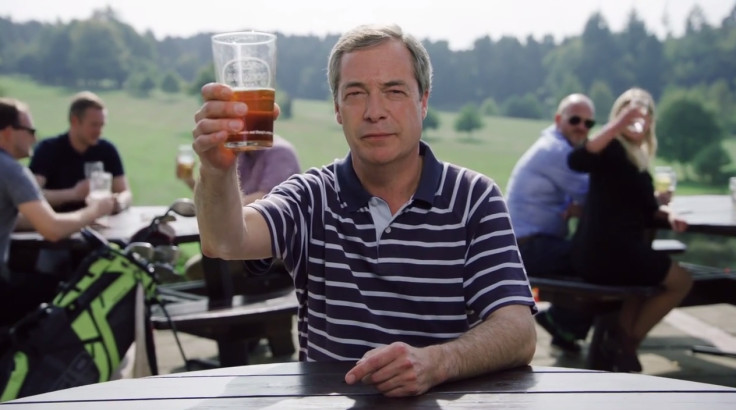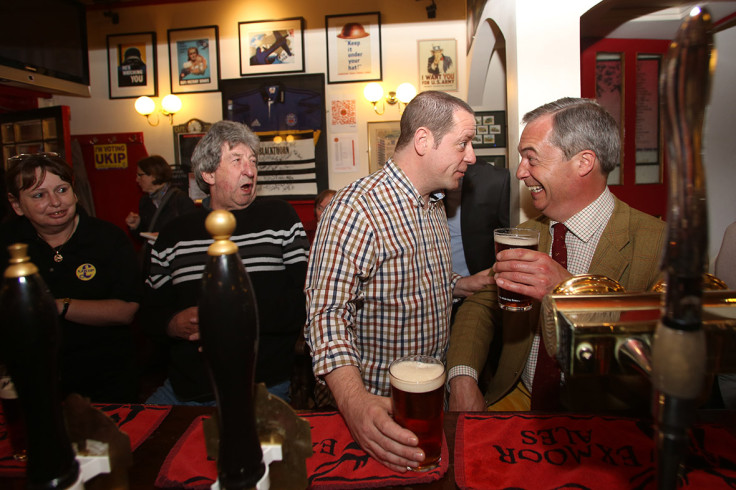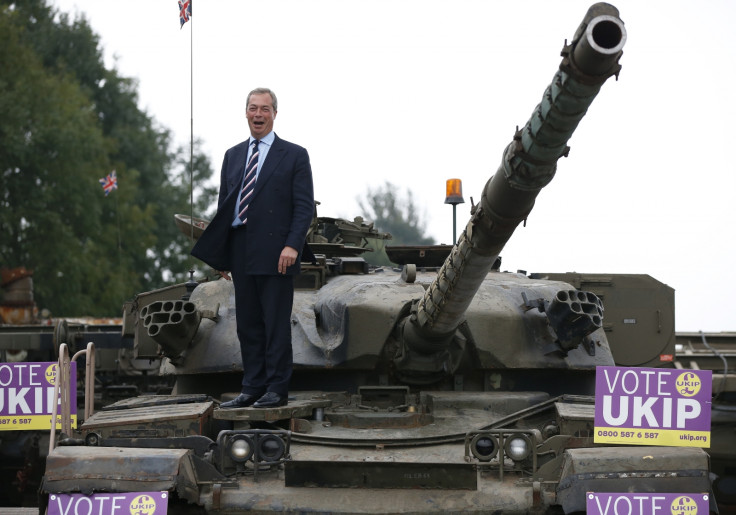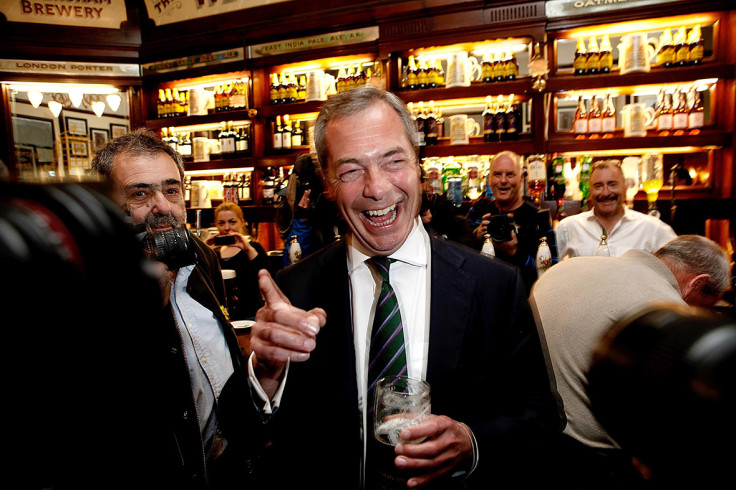Down The Pub with Nigel Farage: An Afternoon of Beer and Cricket with the Ukip Leader

It's 1pm on a Friday afternoon and, like millions of British people, I'm heading down the boozer to celebrate the end of the working week, and forget about the stresses and squabbles it has brought. But today my drinking buddies aren't the virtuous denizens of IBT Towers. Instead, I'll be supping with the most talked-about British politician of the last two decades.
Nigel Farage is currently tearing through the British establishment like a runaway train, and there's no sign of him coming off the tracks any time soon. Loved and loathed by the chattering classes in equal measure, this public schoolboy and former Tory has parked his tanks on Labour's lawn and driven off with the core of their white working-class support. Not since Tony Blair became Labour leader in 1994 has someone had such a transformative effect on our political scene.
Today Farage has agreed to give me 15 minutes of his time over a swift pint in his local, a central London hostelry wedged into a boulevard of posh boutiques. The interview was arranged during an event on Fleet Street earlier in the week, where Farage, speaking for 40 minutes without notes, provided a passionate and supremely knowledgeable take on the First World War. I can only hope he is on the same form today.
When I arrive at the pub my quarry is sat in the window, in full view of passers-by, having a pint and chatting with a gentleman who looks slightly older than him. The pub is, it seems, completely unprotected: passers-by are free to gawp at Farage as thought he were an exotic specimen at London Zoo, and anyone who dislikes the bloke can come inside and vent their spleen. Yet Farage appears to be in his element, his conversation conducted at full volume and punctuated by bursts of raucous, uninhibited laughter.

It appears that our interview will begin a bit late, but Farage's advisor, Raheem, who has organised this interview, is on hand to greet me. Raheem, who I'd guess is in his mid to late-20s, tells me his boss is just finishing off his interview with the Observer, and will be right with me. He suggests I get myself a pint on Ukip's tab: it's clear they come here often.
Raheem himself has enjoyed an interesting life. He tells me his parents moved to the UK from Tanzania, and he previously worked in counter-extremism and edited the London arm of the conservative political website Breitbart.com, before joining Farage's merry band. Today it seems he is the mastermind of the Ukip operation, handling press requests while providing strategic advice to his boss, and, crucially, serving as Ukip's social media expert, managing the party's presence across Facebook, Twitter and all the rest. Some sections of the media like to lampoon Farage as a walking anachronism, yet, from talking to Raheem, it's clear the party's PR operation is razor-sharp.
We go outside because Raheem wants a cigarette. Farage, still perched in the window, spots him moving outside and they point at each other through the glass, acknowledging the moment with obstreperous laughter. I'm not let on this little in-joke, but not to worry, because Farage and the Observer journalist soon come out and join us, carrying the dregs of their pints. The interview is over, but Farage wants some fresh air (well, fresh air laced with nicotine) before he turns his attentions to me.
The interview is littered with pugnacious soundbites. Vladimir Putin is described as a 'gangster' while Ed Miliband is 'disconnected with ordinary people' and Britain's political establishment is 'a closed shop'
The four of us begin talking about Wales. A new poll has come to light showing that Ukip has gained a significant foothold among the Welsh electorate, propelled by the perceived weaknesses of the country's national assembly and religious extremism in Cardiff. Refreshingly, Farage admits this has taken him completely by surprise. Whereas other political leaders might have attempted to take credit for the Welsh surge, he is happy to play down his role, passing off the phenomenon as a happy accident. It's not hard to think of other politicians who would have taken a different tone.
During our little pre-interview chat, three people come up to Farage and ask for a photograph. Two of them are women, who tell Farage that their husbands are huge fans, rather than claiming any affinity for Ukip themselves. Perhaps the polls are right; maybe Ukip is a 'bloke's party' with little relevance to modern women. But Farage doesn't seem to care, lapping up the praise and platitudes and posing for selfies, beer in hand. It's not quite the Beatles in 1964, but, then again, it's hard to imagine David Cameron or Ed Miliband being greeted with such warmth by the great unwashed.

The Observer reporter eventually says his goodbyes and saunters off, his exclusive secured. Farage tells me to fire away. I am somewhat taken aback; he wants to get the interview over and done with in a pub smoking area, rather than resuming the indoor perch from which he expounded his vision to the previous interviewer. It comes across as slightly condescending – an emissary from one of the more established dailies would surely have been invited back inside. But I'm not complaining, particularly as Raheem has just returned from the bar, bearing a half for his boss and another pint for me.
Vague and evasive
The interview lasts 15 minutes, interrupted only when a man from Farage's book publisher – who says he is writing a book on Ukip's meteoric rise – arrives for his own appointment. Farage, almost chain smoking, begins the interview by vigorously refuting my suggestion that he is not a "details man", and seems genuinely affronted by the insinuation. Yet several of his answers come across as woolly, and slightly evasive.
He insists he isn't looking to form a coalition after next year's general election, but doesn't completely rule out the idea. When I put it to him that he has shifted his stance on the NHS, renouncing his previous support for an insurance-based model in favour of a service free at the point of delivery, he says that in the past he was simply trying to start a debate and his earlier pronouncements did not constitute a formal policy.
He says he wants to end Britain's "open door policy" on immigration, without explaining exactly how he'd do it. And he flatly refuses to acknowledge that Britain's EU exit would damage the economy in any way whatsoever.
My suggestion that Ukip will eventually have to reconcile the libertarianism of its star signing, Douglas Carswell, with the more reactionary values of its core support is batted away. Farage claims that it's natural that people within his party will have differing views, but says these aren't particularly significant, particularly as the old left and right "are disappearing in British politics" anyway.
Men are more prone to rolling the dice, and taking risks earlier than women, who are actually naturally more conservative, perhaps even sensible
– Nigel Farage
Perhaps his most interesting remarks come about women. He cites evidence "that men are more prone to rolling the dice, and taking risks earlier than women, who are actually naturally more conservative, perhaps even sensible. Women take a little bit longer to look at a new product and decide whether it's worth buying or not".
A critic might suggest that this view is patronising towards women, even sexist. It's certainly not the sort of thing you'd expect to hear from a man keen to improve his female support base.
The interview is littered with pugnacious soundbites. Vladimir Putin, who Farage previously praised as "brilliant", is described as a "gangster" while Ed Miliband is "disconnected with ordinary people", and Britain's political establishment is "a closed shop". Yet there are plenty of times when Farage seems disinterested. He breaks off on several occasions to say hello to passing well-wishers, and he keeps looking down at his phone while answering my questions, which, again, comes across as a little bit condescending. He certainly didn't seem to be doing that when he was chatting to the Observer man earlier.
After 15 minutes, I'm on my third pint. The man from the publisher has been to the bar and come back out with another pair of ales, without explaining why. Are Farage and his entourage plying me with free booze to ensure a good write-up, I wonder, or are they getting me bladdered to reduce the potency of my interrogation? Perhaps I'm giving myself a bit too much credit here. Anyway, it doesn't matter now. The interview is over, my questions exhausted.
"Well I said I'd do it, and I have," says Farage, slightly curtly.
Now for the real Nigel
But he doesn't send me on my way, oh no. He is happy to stand around for a chat, now the serious stuff is over. The chap from the publisher seems happy to have a natter over a pint in the autumn sunshine, as well. I'm certainly in no rush to shoot off: this is a chance to get to know Farage, the man behind the soundbites. We all know we used to work in the City, and he likes a pint and a fag, but what does he actually enjoy doing when the circus has packed up and gone home?
I ask him what he's doing this weekend. "Catching up on letters tomorrow, maybe watch the rugby," is his response. He says he's not usually a big rugby fan, and isn't mad on football either, although he supports Crystal Palace, where one of his sons now has a season ticket. He tells me his real loves are history – a passion evinced by that brilliant speech on Fleet Street earlier in the week – and cricket. As someone who is passionate about both these subjects, I sense my chance.

We start talking about cricket. Now I have Farage's full attention. He isn't checking his phone any more, or snapping out of the conversation to catch the felicitations of the passing throng. Maybe it's the fact that he's had three halves in the last 45 minutes, maybe he's just a bit more relaxed now the dictaphone is off. But his attitude is different now, totally switched-on. I get the impression that cricket, rather than the minutiae of politics, is what he really enjoys talking about.
It's clear that Farage is a cricket tragic with an encyclopaedic knowledge of the game. He recalls going to watch the England-Australia test at Lords of 1975, and being in awe of the Australian fast bowlers Dennis Lillee and Jeff Thomson. He tells me, proudly, that he hasn't missed an Ashes test match at Lords since then. Michael Atherton, a former England captain turned award-winning journalist, is described as one of the best sports writers in the country, and he reveals that his big hero is Sir Ian Botham, the legendary England all-rounder who was famous for his ability to imbibe copious amounts of alcohol before going out and winning matches with improbable derring-do.
During the interview I didn't really warm to Farage, but now he is genuinely friendly and likeable… This is full-on Farage, and it's an extremely pleasant experience
During the interview I didn't really warm to Farage, but now he is genuinely friendly, and likeable. He leans in to talk to me, never looking away. He listens to my opinions and puts forth his own, talking to me as if we'd been drinking buddies for 30 years. This is full-on Farage, and it's an extremely pleasant experience.
Eventually, after yabbering away about batting averages and bowling figures for a good 20 minutes, the publisher chap interrupts and says it's time to go. They have a few chapters of the book to thrash out. Raheem says he has to go back to the office to catch up on a few things, while Farage shakes my hand firmly and thanks me for coming, before going back into the pub, his court, to deal with another member of his coterie.
I start walking away myself, feeling a bit tipsy, the effect of the alcohol accentuated by the surreal nature of the conversation which has just finished.
The fact that Sir Ian Botham is Farage's hero is certainly interesting. Both men are famous for their love of a pint and for the atavistic right-wing views they espouse. Both have been lampooned in the press for clinging to a Britain that no longer exists. Yet both are, it seems, blessed with a real warmth, as well as an ability to capture the popular mood.
Some of Nigel Farage's policies seem vague. Some seem naïve, some plain wrong-headed. But there is something extremely heartening and appealing about the man. A Ukip government probably wouldn't be great for Britain, but Nigel Farage the politician is most definitely a good thing.
© Copyright IBTimes 2025. All rights reserved.





















